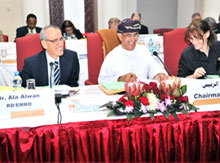 RC60 addressed several priority health issues in its resolutions Muscat, Oman, 30 October 2013 - The Sixtieth Session of the WHO Regional Committee for the Eastern Mediterranean concluded its work in Muscat by considering several resolutions proposed by Member States to address priority health issues of concern to the Region.
RC60 addressed several priority health issues in its resolutions Muscat, Oman, 30 October 2013 - The Sixtieth Session of the WHO Regional Committee for the Eastern Mediterranean concluded its work in Muscat by considering several resolutions proposed by Member States to address priority health issues of concern to the Region.
One of the resolutions addressed the escalation of the polio emergency in the Region, declaring the circulation of poliovirus in the Region as an emergency for all Member States. It called on Pakistan to take necessary steps to ensure all children were assessed and vaccinated as a matter of utmost emergency to prevent further international spread and requested the Syrian Arab Republic and adjoining countries to coordinate, and if possible, to synchronize, intensified mass vaccination campaigns using the most appropriate tactics and vaccines to interrupt this new outbreak within 6 months
Another resolution addressed universal health coverage. The Regional Committee called on Member States to ensure sustained political commitment to universal health coverage in order to ensure that all people had access to essential health services that were of sufficient quality without incurring the risk of financial hardship.
The Regional Committee also endorsed the Dubai Declaration: Saving the lives of mothers and children: rising to the challenge. Committee Members urged the high-burden countries to strengthen multisectoral partnership in order to implement their national acceleration plans and allocate the necessary human and financial resources and mobilize additional resources as necessary.
It also endorsed the regional strategy for the improvement of civil registration and vital statistics system 2014–2019 urging Member States to give priority to the strengthening of their national systems and develop multisectoral strategies to improve civil registration and vital statistics systems based on the findings of an in-depth assessment and guided by the regional strategy.
Another endorsed strategy was the regional strategy on health and environment 2014–2019 and its framework for action. It requested the Regional Director to provide technical support to Member States to adapt and implement the regional strategy and to build partnerships with United Nations agencies and other relevant stakeholders
Adopting the Annual Report of the Regional Director for 2012, the Regional Committee urged middle income countries to participate in the pooled vaccine procurement system and to sign a memorandum of understanding with WHO and UNICEF to complete the participation process before the end of this year. The Regional Committee requested the Regional Director to support Member States in developing and implementing strategies and service-delivery approaches for rapid scale-up of HIV treatment, as recommended by WHO and UNAIDS in the regional report Accelerating HIV treatment.
Another resolution urged Member States to request to the President of the United Nations General Assembly to consider holding a high-level meeting, with the participation of the Heads of States and Governments, on a comprehensive review and assessment on the occasion of the general debate at the Sixty-ninth Session of the United Nations General Assembly in September 2014. In this regard the Regional Director was requested by the Regional Committee to coordinate with the United Nations Secretariat to ensure that the comprehensive review will lead to a concise action-oriented document and to support Member States..



